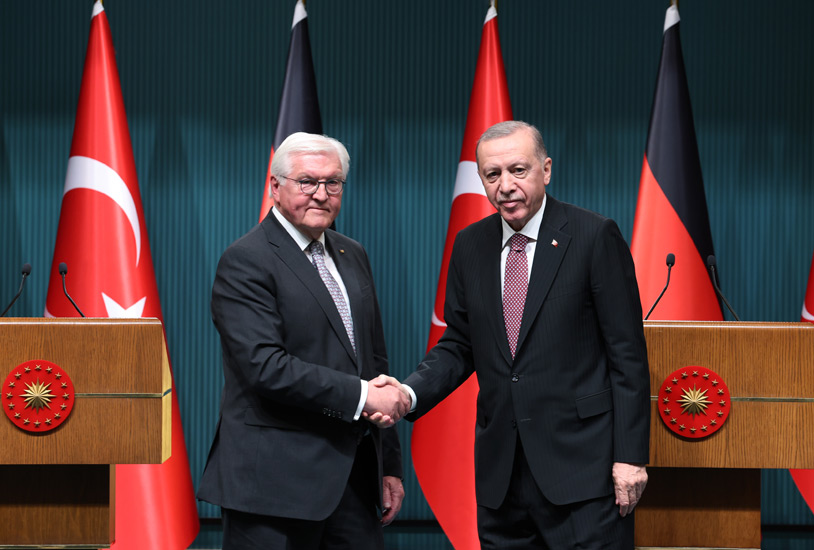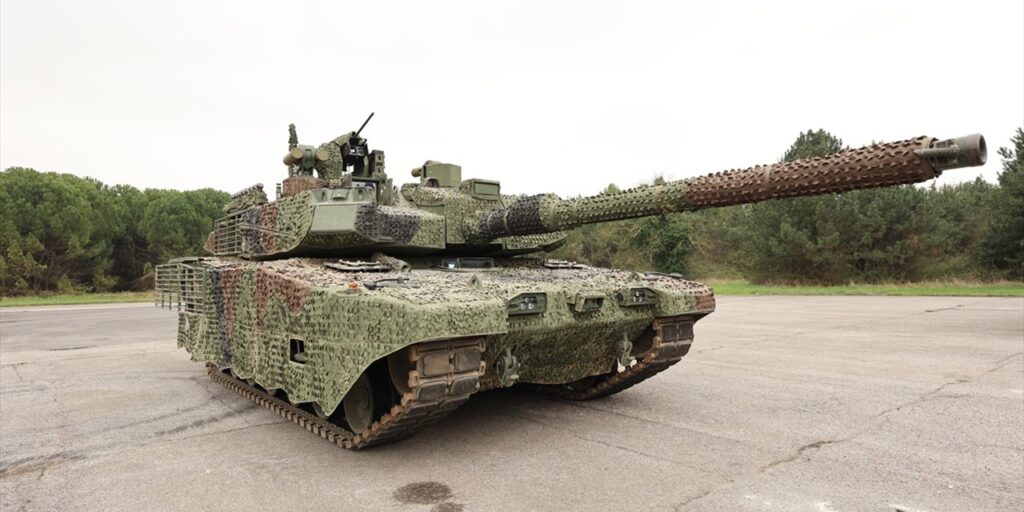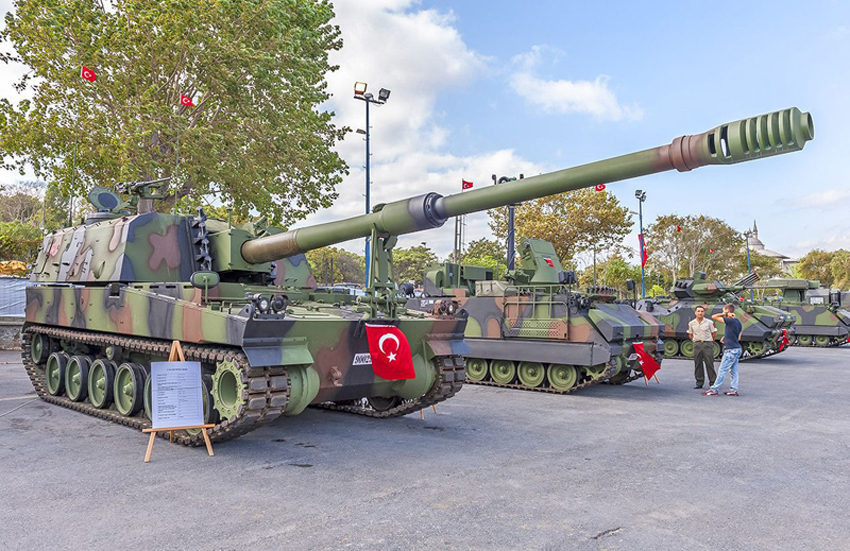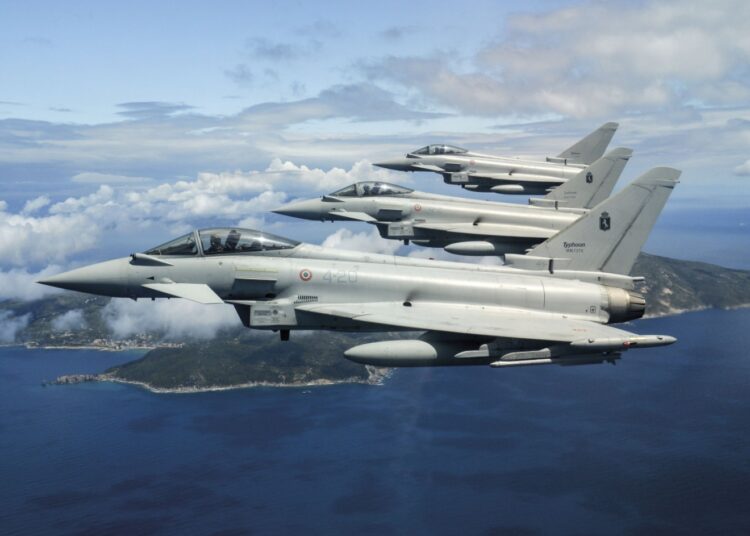Levent Kenez/Stockholm
Ankara seeks Germany’s lifting of various restrictions imposed on arms exports since 2016 and the removal of its reservations regarding Turkey’s desire to acquire the Eurofighter.
During German President Frank-Walter Steinmeier’s visit to Ankara this week, restrictions on Turkey in the defense industry sector came under discussion. Turkish President Recep Tayyip Erdogan expressed his desire for defense industry relations to be in line with the spirit of the alliance, stating, “I want us to completely remove the restrictions we face in the defense industry from our agenda.”
Erdoğan proposed to his counterpart that Turkey and Germany, especially in the defense sector, should not dwell on obstacles but rather focus on discussing joint production projects.

Turkey is in need of engines and transmission systems for certain indigenous defense industry projects that it has been unsuccessful in sourcing from Germany. The government has made extensive efforts to procure these components from abroad for the mass production of the Fırtına howitzer and the Altay tank project. However, Turkey has faced challenges in obtaining them from Germany.
The Altay project was Turkey’s inaugural main battle tank program, encompassing electronic command and control systems, a 120-millimeter gun and armor, all of which are slated to be produced by Turkish defense contractors.
The Fırtına howitzer, a domestic artillery project, also needs an engine and transmission system. Since a licensing agreement could not be concluded with the Germans, who had provided the systems in the past, Turkey looked for alternate suppliers.

The Turkish land forces rely heavily on Fırtına artillery in cross-border operations, especially in Syria, to provide cover for its troops and suppress enemy fire. Turkey also wanted to export them to other countries but was blocked by Germany. According to former defense minister Hulusi Akar, six Fırtına were manufactured in Turkey in 2021. However, they were produced by using long-ago imported engines for developing prototypes.
Meanwhile, Turkey’s interest in acquiring 40 Eurofighter Typhoon jets continues despite the United States advancing a $23 billion sale of F-16 fighter jets to Ankara.
In November 2023 Turkey announced its negotiations with Britain and Spain for the purchase of Typhoons, despite objections from Germany.
The Eurofighter Typhoon jets are produced by a consortium comprising Germany, Britain, Italy and Spain, represented by Airbus, BAE Systems, and Leonardo.
A Turkish defense ministry official, speaking on condition of anonymity to Reuters, said, “We are still interested; we expect the consortium member Germany’s positive approach on this issue.”
During his visit to Germany on November 17, 2023, President Erdogan responded to a question posed during a press conference with Chancellor Olaf Scholz regarding the possibility of acquiring Typhoon jets from Germany, Erdogan said, “Whether Germany provides them or not, is Germany the only place in the entire world that produces warplanes? We can procure them from many other places.”
Erdogan’s remarks were interpreted as a continuation of the disagreement between the two countries. However, with Turkey’s potential acquisition of F-16s from the US, defense industry experts suggest that Turkey’s having an alternative may influence Germany’s stance on the Eurofighter issue and that Turkey’s potential purchase from American suppliers could influence the decision-making process in favor of European manufacturers. Ankara previously announced that even if it acquires the F-16s, it will purchase different jets to diversify its fleet. One reason for this is that in 2021, the US administration officially removed Turkey from the F-35 Joint Strike Fighter program due to Ankara’s purchase of the Russian S-400 missile system in 2017.
Ironically, during a reception held in parliament on Tuesday, Defense Minister Yaşar Güler responded to a question from journalists about whether there would be a meeting with German President Steinmeier regarding the Eurofighter. Güler humorously remarked, “The man is busy cutting döner [a traditional Turkish meat dish]. We’ll ask him after he finishes. Developments in Eurofighter negotiations are ongoing.” Güler’s mention of Steinmeier serving döner referenced a reception held on Monday in his honor in Istanbul at which Steinmeier had personally served döner to guests.
Arms exports from Germany to Turkey had also prompted discussions in the German parliament last year. The response from the Ministry of Economy to a question raised by Sevim Dağdelen, a member of the German parliament of Turkish origin, revealed that arms exports to Turkey in 2023 were minimal. According to ministry data, the German government had approved only 17 export licenses with a total value of 1.22 million euros by the beginning of December 2023.
Germany had restricted arms export licenses to Turkey following an attempted coup on July 15, 2016 and unilateral Turkish military operations in northern Syria. In response to the parliamentary query, it was noted that the export licenses granted for Turkey in 2023 were limited to cooperation projects linked with NATO and certain orders. Additionally, licenses were reported to have been issued for exports related to scanning, hazardous material cleanup, communications equipment and hunting rifles. Germany had previously said it only sold spare parts necessary for Turkey’s navy.

The Erdogan government had successfully persuaded Sweden and Finland to lift their undeclared restrictions on arms exports in exchange for approval of their NATO membership. Additionally, Canada had lifted the export ban on optical systems, particularly those used in indigenous unmanned aerial vehicles. In a notice to exporters, the Canadian government said military equipment and specific types of weapons destined for Turkey would be reviewed on a case-by case basis. The government declared that the policy of denial of exports was “no longer in place.”
However, there has so far been no progress in lifting Germany’s arms sales restrictions.












